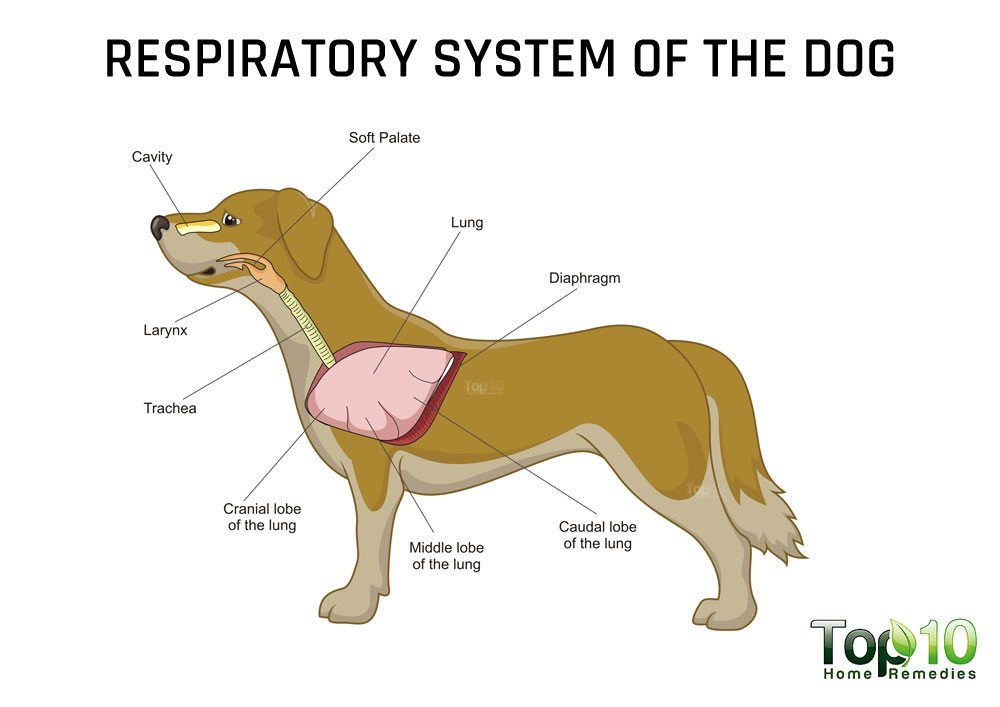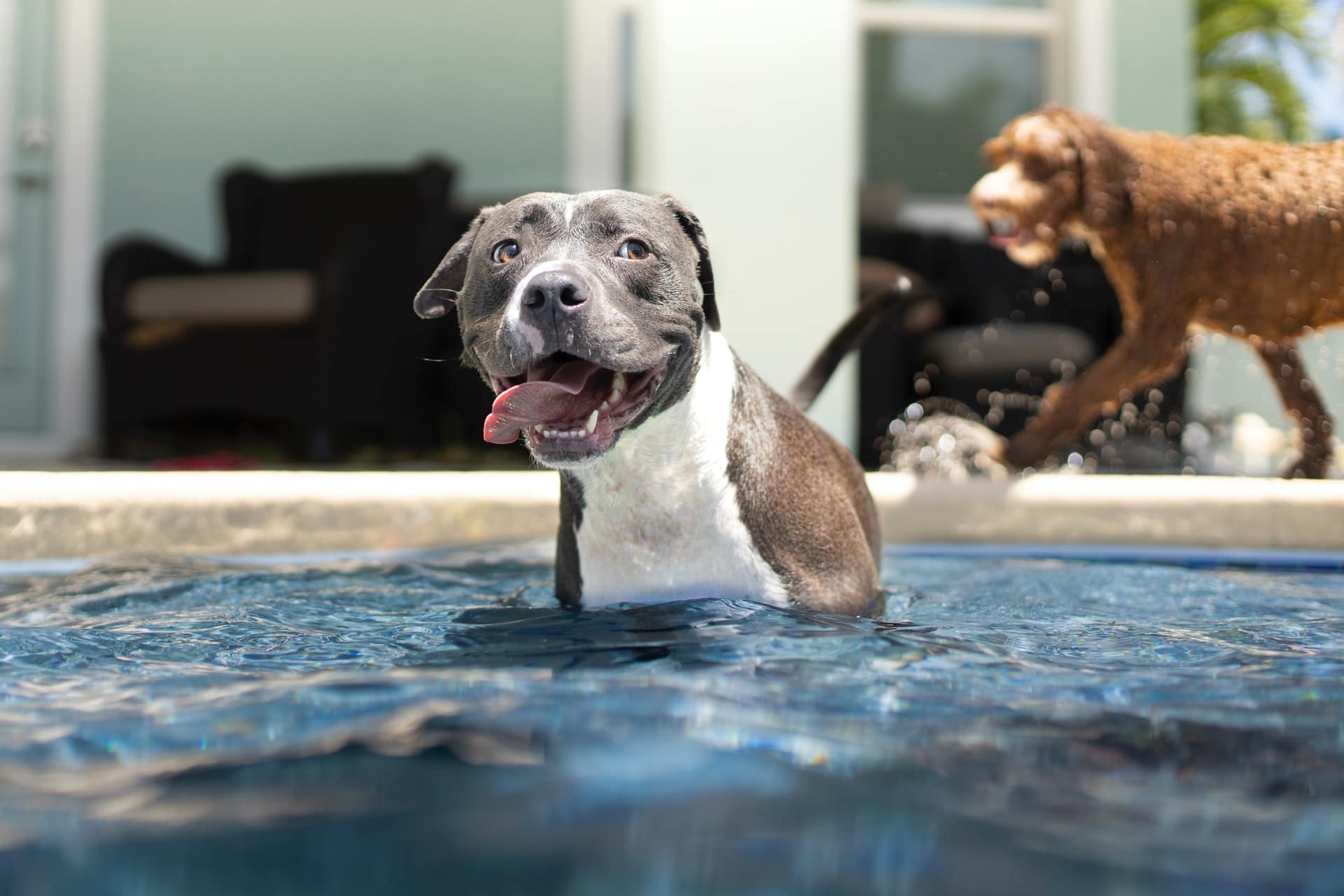Heavy breathing in dogs can quickly go from “as expected” to an emergency.
It’s normal for your dog to breathe heavily after playing and running around. But you should be concerned about laboured panting during rest or inactivity and longer-than-normal cool-down periods.
But don’t panic. Here’s how to tell if your pup needs help and when to go to the vet.
Should I immediately consult a vet? When to be concerned?
Consult a vet immediately if your dog:
- is panting with a partially open or fully closed mouth,
- is breathing heavy and seems to be in pain,
- is panting suddenly while resting and without prior exercise,
- isn’t getting enough oxygen – the most common symptoms include coloured tongue or gums (blue, white, or purple),
- heavy breathing is either constant or increasing instead of cooling down,
- is coughing heavily and making noises while breathing,
- has their tongue curled upwards.
Quick disclaimer: JugDog.co.uk is not a qualified source of canine medical help. This guide is purely for information purposes and must not be mistaken for medical advice. If you suspect your dog needs medical attention, consult a vet immediately.
Is rapid breathing in dogs an emergency?
Since you’re still reading, I believe your dog either didn’t have the above symptoms, or you have successfully contacted the vet.
Your dog breathing heavily and panting constantly may or may not be an emergency, depending on the intensity. The treatment also depends on the underlying cause, which is hard to determine at home.

1. How fast should a dog breathe?
Dogs generally have a breathing rate of 15 to 30 breaths per minute. Although it heavily depends on your dog’s health condition – a breath rate under 30 can also be considered alarming in some cases. Always ask your vet for the expected breath rate of your dog.
2. How to calculate a dog’s breathing rate?
A dog’s breathing rate is usually counted with either a 30-second timer or a 1-minute one. Of course, the number of breaths during a 30-second interval is multiplied by 2 to get the breathing rate.
A dog’s one complete breath is indicated by its chest moving in and out once. Use your watch and take the breath rate two to three times to get an accurate average.
Read More: What is the best worm treatment for dogs? How to do deworming at home?
Why is my dog breathing fast while resting?
1. Heart Problems / Heart Failure
Although dogs are generally in better health than humans, they can still suffer from heart problems at any age.
While heavy breathing and panting are common symptoms, don’t go diagnosing heart problems at home. Many heart problems can be resolved with medicine and a lifestyle change, so there’s no need to panic if the symptoms have only emerged.
Mitral valve disease is the most common heart disease in dogs which causes blood to leak back into the valves, causing more stress on the heart. This can lead to an enlarged heart and fast breathing (among other symptoms).
So, what are the symptoms of congestive heart failure in dogs?
Heavy and fast breathing, unwarranted lethargy, and exertion accompanied by whining and coughing are the most common symptoms of congestive heart failure in dogs. Seek immediate medical assistance in case your dog requires an ACE inhibitor.
2. Heat stroke
Heat stroke is a common cause of tachypnea, especially during warmer months. Older dogs are at greater risk. Tachypnea happens dogs cannot expel the heat quickly enough, often leading to dehydration.
Heat stroke symptoms in dogs are weakness, collapse, confusion, shivering, seizures, diarrhoea, vomiting, drooling and foaming at the mouth. It is a very serious condition that can be fatal if left untreated.
Be sure to respond immediately. I’ll cover the necessary steps in a minute.
3. Respiratory Problems

Fast breathing is a respiratory problem in itself. Still, there are a few other causes of sudden changes in breathing including laryngeal paralysis, pneumonia, allergic reactions, and lung disease.
So, what are the signs of respiratory distress in a dog?
Respiratory distress is indicated by heavy breathing that’s strained and often painful; not to be confused with fast, shallow panting. Consult a vet as soon as possible if you notice uncomfortable, laboured breathing in your dog. Treatment is possible if spotted early and the cause isn’t serious.
4. Cushing’s disease
Cushing’s disease (also known as Cushing’s syndrome) is a condition where the dog is producing too many hormones. It creates a chaotic imbalance within the dog leading to lethargy, increased appetite, water consumption and heavy panting.
It’s a life-threatening disease that requires immediate attention.
If your dog is hungrier and thirstier than usual while still being lethargic, give your vet a call to discuss. However, don’t panic if your dog is merely peckish and panting due to hot weather, as it can easily be confused with Cushing’s.
5. Fluid in the lungs
Excessive fluid build-up can cause major problems, with fast breathing being one of the indicators, lips changing colour and a low temperature.
As for some of the more serious causes of fast breathing in dogs, thankfully this probably won’t be the first sign that something is amiss. Fluid buildup in the lungs is more often than not a byproduct of another underlying cause.
6. Anaemia
Anaemia in dogs is a scenario where the dog has lost a lot of red blood cells. Alongside heavy breathing, your dog will be more lethargic than usual.
The most obvious symptom of anaemia is changing the gums’ colour from the normal bright pink to pale pink or even white. However, checking the dog’s gums is the quickest and most obvious way to determine if they are anaemic.
7. Excessive exercise
When exercising or being very active with your dog, give them plenty of rest in between – dogs are keen to make their masters happy, including working past their limits.
Symptoms that your dog has done too much are fast and laboured breathing, drooling, a high temperature, collapsing, weakness, inability to focus, and seizures. Unlike congestive heart failure, this is an avoidable case with a certain vigilance and attention.
Although all dogs can be exercised too much, overexertion and rhabdomyolysis are more common in athletic and working breeds. So be careful with those, especially on hot days, as they’re more willing to keep working.
8. Injury/pain
Fast breathing can follow if your dog has an injury or is in pain. When you notice irregular breathing, check to see if they’ve been hurt.
Most minor injuries don’t lead to anything other than a bit of rest. For something to cause panting and heavy breathing, it would need to be serious such as a laceration or broken bones.
9. Eclampsia
You may or may not be familiar with eclampsia, a complication of human pregnancy. Well, dogs (bitches) can get eclampsia, too, and it’s just as serious for them.
Eclampsia is a condition with a dangerous and sudden drop in blood calcium levels in nursing mothers. Typically eclampsia happens when the pups are between 1 and 5 weeks old.
Signs include stiff limbs, weakness, tremors and fast breathing.
10. Lung cancer/tumour
Cancer can lead to fast breathing, strained breathing and many other unwanted symptoms in dogs.
If it’s lung cancer, then rapid breathing is a rare symptom. However, lung tumours, specifically adenocarcinoma, are more likely to cause faster breathing in dogs.
Both conditions are quite rare and usually only surface in dogs older than 10. In short, it should be the last possible cause in your mind, given how rare it is.
Read More: Water Intoxication in Dogs: What is it and how to reverse it?
How do I slow down my dog’s breathing?

Now that you know the issues, let’s discuss how to deal with them.
First, while immediate assistance is important, don’t administer any treatment without your vet’s instructions. You could accidentally make things worse despite.
If your dog has a history of respiratory issues, start oxygen therapy or medication, depending on your veterinarian’s advice. Otherwise, take a quick look around the area to find clues about what happened.
Consider asking someone dependable to look for information while you rush to the vet. Simple observations can be the difference between life and death..
While you can’t do much if it’s an internal issue, you can administer first aid for bloating, water intoxication and related problems.
If you suspect heatstroke, immediately move your dog to a cooler area with lots of shade. Encourage cool water hydration. You can also wrap your dog in wet towels to safely lower the temperature.
Don’t use extreme measures like forcing them to drink or spraying them with cold water. A sudden drop in temperature is dangerous.
Once your pup has cooled off, take them to a vet for a checkup, even if they stop panting. Better safe than sorry.
Do dogs breathe fast when tired? How to differentiate?
Dogs breathe fast and heavy when tired, making it harder to determine if there’s a bigger issue. Stop the activity immediately, and get them some water and shade. If the breathing is constantly fast and shallow during the cooldown period, it’s likely an emergency.
1. What is belly breathing, and why is my dog doing it?
The symptoms of dyspnea (laboured breathing) in dogs include the dog’s abdomen moving along with the chest. It looks like your furball is breathing from its belly (stomach). It’s usually a symptom of congestive heart failure, heat stroke, trauma, or the presence of a foreign object.
In short, “belly-breathing” is just an effect caused by the same circumstances that lead to unusual panting in dogs. And if you have been reading properly, you’re already well equipped to handle such a situation.
2. How to prevent such extreme situations?
Since there are various causes, you have to tackle each problem differently.
- Ensure that the supervision of your dog is foolproof, especially when outside (or in any unknown environment). This could help avoid trauma and ingestion of foreign objects.
- Frequent health checkups and screenings can detect and protect against severe situations such as advanced stages of congestive heart failure. It’ll also help in the detection of respiratory issues even before adulthood.
- Keep a strict check on your dog’s diet to prevent bloating (excess salt) and water intoxication (excess water).
- You can prevent heat stroke in dogs by keeping them in the shade and providing the necessary water. This is especially important for obese and senior dogs since they’re also at high risk of developing heart-related issues.




